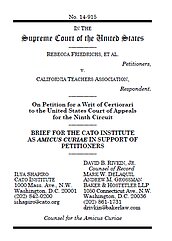Friedrichs v. California Teachers Association
Learn more about Cato’s Amicus Briefs Program.
The right to be free from compulsory speech is as fundamental as the right to speak freely. In fact, forcing people to financially support views with which they disagree is in some ways worse than preventing them from speaking freely. Not only does the other side get more money, but the dissenters are then left with fewer resources to speak their own minds. Nevertheless, in twenty-six states public-sector unions enjoy the privilege of collecting compulsory dues from nonmembers and then using that money to lobby the government for preferred policies. Friedrichs v. California Teachers Association is a challenge to the extraordinary privilege given to public-sector unions—the power to essentially tax nonmembers and to spend that money on political advocacy. Ever since the 1977 case of Abood v. Detroit Board of Education, it has been unconstitutional for unions to spend nonmembers’ compulsory dues on blatant political activity such as political ads. But unions can still collect so-called “agency fees” from nonmembers in order to fund activities “germane to [the union’s] functions as exclusive bargaining representative” such as the costs of collective bargaining to secure “advantages in wages, hours, and other conditions of employment.” Every year, public-sector unions must separate their political spending from their “agency fees” and give nonmembers an opportunity to opt-out of the political spending. Yet, when it comes to public-sector unions, it is somewhat bizarre to say that some of the spending is “political” and some isn’t. A teachers union may run political ads advocating for particular public policy positions, but it also collectively bargains in order to fight for similarly “political” gains, such as class size, school year length, and teacher qualifications. In a sense, a teachers union is just another political party that lobbies the government for preferred policies, and, whether it is spending on political ads or collectively bargaining, both are “political.” Yet teachers unions in twenty-six states enjoy the extraordinary privilege to compel nonmembers to fund their activities. Other groups, such as parents, don’t enjoy the privilege of forcing all parents to fund the PTA, so why do teachers get to do it? Friedrichs asks the Court to revisit Abood’s distinction between political and nonpolitical compulsory dues for public-sector unions. Alternatively, the petition asks the Court to examine whether an “opt-out” system for compulsory dues meets First Amendment scrutiny. In many parts of the country, nonmember employees have to affirmatively opt out of funding the union’s political activities each year. Cato’s brief argues that the existence of opt-out requirements is a historical accident that never received proper First Amendment scrutiny from the Supreme Court. And, if they are given that scrutiny, then opt-out provisions must fail. After all, if, as Abood said, unions are prohibited from using compulsory dues to fund political activity, then why should the opt-out system essentially presume that nonmembers consent to the union’s political spending? In order to properly protect nonmembers’ First Amendment rights, nonmembers should be required to opt-in to funding their union’s political activities. Public-sector unions, like other interest groups in society, should have to rely on voluntary contributions to fund their political activities, and the Court should grant certiorari in Friedrichs to correct this difference.
